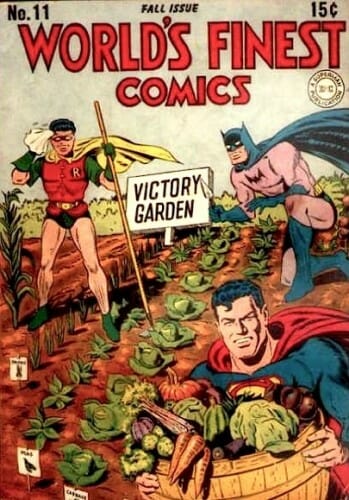Comparative Advantage
Sometimes I have odd reactions to things. For example, my immediate reaction to this comic book cover was, "comparative advantage fail."
I am sure that Superman would be a super-productive gardener, but there are likely much better tasks to assign him for which his comparative advantage is much greater.

Here is a comic that follows the comparative advantages of Superman to a logical conclusion:
http://www.smbc-comics.com/index.php?db=comics&id=2305#comic
I understand what you are saying Warren, but you need to remember in WWII many people were displaced from their optimal performance to go out and fight a war - The Sulvan Bros gave their lives to the War effort rather than Farm in Iowa for instance.
http://en.wikipedia.org/wiki/Sullivan_brothers
The folks left at home had to make due with the remaining skills they have, double up, double down, and create garden's in their spare time rather then play on WWII equ of facebook so they would have enough to eat while half the men were overseas protecting us from Hitler and the Emperor.
In normal times, as you point out, it makes sense to just have farmers garden and superman fight crime, it times of world war it is different.
Like being a newspaper photographer?
Or, you know, Superman could drive a turbine to power the entire USA by himself. Or fly over and destroy Hitler's head quarters single handedly.
Nah, probably best that he produce cabbage.
My immediate reaction was "Why isn't Batman wearing a shirt or pants?"
We are assuming he is doing this in his spare time and has completed his crime fighting duties for the day. If Superman goes after Hilter, Lex Luthor would run amok in the USA.
Why did we let women with no prior factory knowlege build munitions in WWII? Wouldn't it be better to have the men continue with the factory jobs, and send the women overseas.
I had the same reaction as Warren imagining Hitler, Tojo, and Mussolini awaiting the inevitable onslaught and their demise from the Man of Steel only to learn that Superman wouldn't be coming to defeat evil today as he was busy picking cabbage.
Of course the easiest way to eliminate the problem the Victory Garden was designed to solve would be I don't know.... achieve victory.
Just a thought
I actually learned about this very subject when in grade school, I think, I asked my Granddad why he and his brothers didn't fight in WWII...I hadn't heard him talk about war stories and I was wondering if our Italian heritage factored in. His answer was off my radar in that he said the gov't asked them to remain at work (for one of the largest fruit companies of its time) and to produce as much food as possible with the available resources. Not that I can quite bring myself to picture my Grandad and is brothers in tights, I did then appreciate the fact that there are many nitches to be filled in times of war...and i think they would have welcomed the help with their operations they too would agree with your post.
Thanks......I have to share this post with my family.
My Dad recently has talked about how they were given extra gas rations specifically to allow his dad to manage the various properties throughout the western states.
Why are we assuming this is in his free time? And again, why wouldn't he smash the Axis powers in his free time? (Assuming fighting crime is more important for some reason.)
As to your second question, other than pointing you to a book on comparative advantage or general economics (this one is good http://www.amazon.com/Exchange-Production-Competition-Coordination-Control/dp/0534004938/ref=sr_1_sc_3?ie=UTF8&qid=1348160021&sr=8-3-spell&keywords=alchien+and+allen) one needs to look at the difference between war fighting skills and factory skills. From a comparative advantage standpoint, men are generally sent into combat because there is a greater difference between their fighting ability and women's than there is between their ability to work at a factory compared to women's. Men have both an absolute advantage in fighting and a relative advantage (assuming they are always better at fighting and roughly equal or better at factory work; big assumption I will admit, but probably roughly true in the 30's) if you figure that fighting is more valuable than factory work. During WW2 that was probably considered true. So it makes sense to have men produce the fighting and the women to produce the factory work, even if the men are better at factory work too. It is a little easier to see with numbers, but for that I will point you back to the book.
I totally swiped this.
http://nightskyradio.wordpress.com/2012/09/20/do-you-have-your-papers-mr-kent/
Don't forget that Superman is an undocumented worker from another planet.
You're also neglecting the basis behind the historical "women and children first" in terms of sending women out war fighting. There is a very logical reason why men tend to be the warriors and women stay at home -- if you have 1,000,000 women and 10,000 men surviving, the human race is probably ok. If you have 1,000,000 men and 10,000 women, you have a major problem.
Which should make him perfectly at home in the 40s doing farm labor.
Like, DUH.
I recall seeing a Superman comic cover during WW2. He was helping the war effort by handling a rifle to a GI. I immediately wondered why he didn't just toss Hitler and Tojo in jail. Or at least sink the Imperial Fleet. And I was suspicious of Santa Claus from the start.